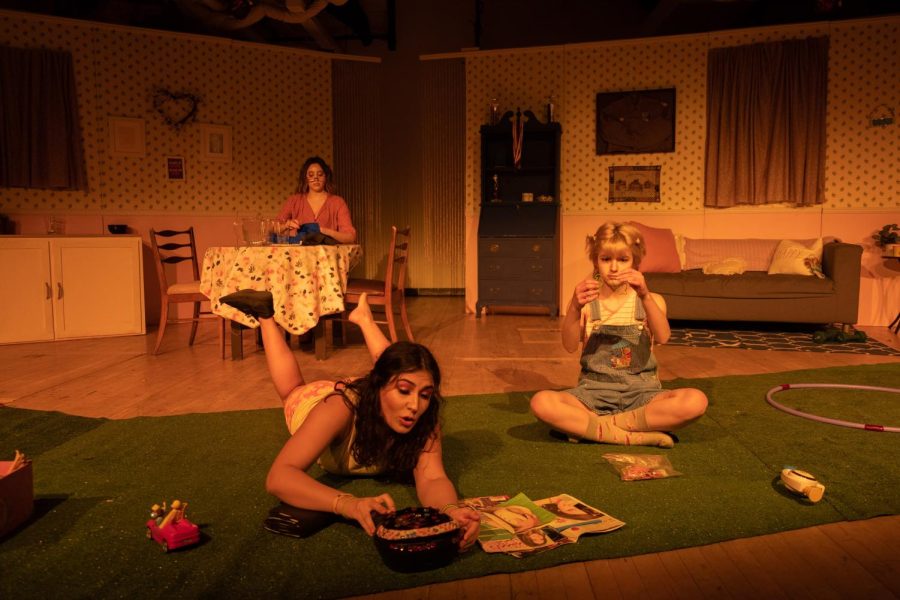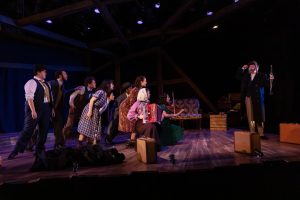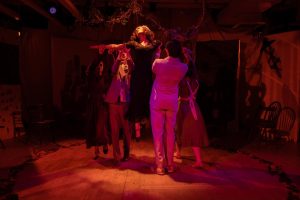‘When Birds Don’t Fly’: A Pageant-Perfect Production
Fordham playwright Vivienne Blouin, FCLC ’24, highlights women’s beauty standards in “When Birds Don’t Fly”
COURTESY OF HELEN HYLTON
“When Birds Don’t Fly” ran from Feb. 28 through March 4 in the Whitebox Theater.
March 23, 2023
A pageant star, a suburban mom and an unobtrusive little sister: all female character archetypes that most media tends to fit into one-dimensional molds. However, playwright Vivienne Blouin, Fordham College at Lincoln Center (FCLC) ’24, gracefully fleshes these characters out in her play “When Birds Don’t Fly,” performed on Feb. 28, March 2 and March 4.
In the brilliant one-act play set outside of Charleston, South Carolina, a now-adult former pageant star, Mckenzie (Riley Halpern, FCLC ’25), moves back in with her mother, Celia (Yasemin Cem, FCLC ’25), and younger sister, Magnolia (ViVi Aiello, FCLC ’26), after struggling with alcoholism.
The women’s relationships with one another take center stage. Blouin explained that she really wanted to explore “how beauty standards affect the relationships between women, especially in families.”
The show is about the ways that “sexist and misogynistic power structures — even if there are no men present in the room — still impede the way women can connect with one another,” director Cora Therber, FCLC ’24, said. Even within all-female families, women are still expecting to be the best version of themselves: They feel the need to “perform.”
Blouin’s script does a fantastic job of viewing imperfect characters through a lens of empathy.
Blouin’s script began as a wall of sticky notes in her dorm room, and she sat with the script for about a year and a half. The first time she saw the actors perform in rehearsals, she cried.
“It was just so surreal to see something that I’ve imagined in my head so many times come to life and kind of be how I pictured it,” Blouin said.
The play is nonlinear, jumping back and forth in time and showing the women at different ages. Through this, the audience witnesses the characters’ relationships fluctuate.
“It’s very focused because it’s set in this one household and one family. The three people on stage make it more emotional and personal,” assistant director and choreographer Kana Seiki, FCLC ’24, said.
In between scenes, the lights suddenly lowered and iconic songs such as “What Time Is It?” from “High School Musical 2” brought the audience into the next part. Lighting director Lee Lillis, FCLC ’24, opted for a low, fluorescent green to convert the stage into the backstage of a pageant. Costume designer Peter Chan, FCLC ’24, rolled a clothing rack onto the stage, changing the sisters and mother’s age through their wardrobe.
The transitions mirrored the theme of women’s performance and “how much their appearance plays into who they are, how they see themselves and how they see each other,” Halpern said.
A melodic country song played as the sisters morphed into their younger selves from the first scene into the second. All of a sudden, assistant sound designer Leah Getz, FCLC ’23, charmed the audience when the song switched to “SexyBack” by Justin Timberlake.
Mckenzie and Magnolia became the best-friend-sisters I wish I’d had in the second scene. Aiello felt similarly, saying she embraced her childlike wonder in the role.
Jumping a few years forward, Miley Cyrus’ “We Can’t Stop” set the scene perfectly for the aftermath of 18-year-old Mckenzie’s drunk stumble home where she is comforted by Magnolia. Her warmth in this scene was natural. Aiello explained that Magnolia “puts other people before herself.”
At the end of this scene, the spotlight shines pink on Magnolia alone on stage as we hear her inner thoughts through a monologue formatted like a pageant speech. Magnolia comes to the inevitable realization that “Mom is a human being.” The compassion the characters have for one another is rewarding amid the heartache I felt for them.
Time passes and the audience sees the three women prepare for Celia’s mother’s funeral. Magnolia appeared in flat moccasins. This is unacceptable attire to Celia, who flaunted impressive stilettos. However, the audience later realizes that Celia is not as shallow as she may first appear.
The audience is offered a moment of insight into Celia in this scene, through her own pink-spotlighted “pageant speech” where she shares, “So if you ask what I want to be, or what I wanted to be when I grew up, I probably wouldn’t have said a receptionist. But I have always wanted to be a mom.”
Celia connected with her daughters through pageantry, just as she connected with her own mom about it. “That highlights how important this really is to her — being a successful mother. And that makes everything more heartbreaking,” Cem said.
Blouin’s script does a fantastic job of viewing imperfect characters through a lens of empathy. “One of my favorite things about the play is the grace that it holds for the characters in it,” Therber said.
In the emotional final scene, the year is 2022, and Mckenzie is dressed in a beautiful pink pageant dress, a crown and sash. She delivered her intimate pageant speech, “If beauty is pain, I want to know how ugly feels.” If by some luck you’ve never felt the painstaking desire to be beautiful and seen, you felt it through Mckenzie and Celia.
Each member of the “When Birds Don’t Fly” team stressed what Blouin called “the power of friendship” in their practice process. “I think it makes a huge difference to have people on the show that you can trust, especially since this show was really personal to me,” Blouin said.
“When Birds Don’t Fly” was a combination of whimsical and somber but was ultimately heartwarming. The play showcased Blouin’s talent for writing and creating well-developed characters, reflected in the actors’ unforgettable performances.















